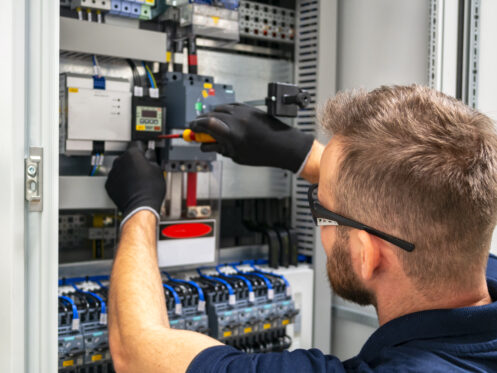How many times have you heard about a home or business fire? The chances are that electrical fires are possibly to blame for thousands of fire incidents worldwide. Fires can have severe consequences, including damaged property, injuries, or fatalities. The good news is that you can reduce the chances of an electrical fire through appropriate safety measures. For this reason, making sure you are familiar with the available tools to help you secure your home or business from electrical threats is important. We help you understand the ways to do so effectively.
1. Whole-Home Surge Protection
All of your electrical devices will be protected from surges that are capable of causing fire when you install whole-home surge protection. A whole-house surge protector detects excess voltage and directs it to the ground before it can harm any connected gadgets or home devices. Once you’ve installed one in your service panel, it can defend your house against two kinds of surges. One is those that strike from outside, like lightning or changes in the power grid, and the other can be caused by your property, like air conditioners and fridges starting and ceasing as they strive to maintain a stable temperature. Notably, this method is essential in preventing electrical fires caused by circuit overloads and device damage.
2. Panel Inspections and Maintenance
The electrical panel, or the breaker box, is the main hub of a home electrical system. Regularly inspecting and maintaining it is paramount as this helps prevent electrical fires. Over time, some connections in the electrical panel become loose, breakers wear out, or the panel itself becomes outdated or too small to serve modern electrical demands at home. A licensed electrician should periodically check the panel for proper function, to ensure it’s the correct size for your home’s electrical demand, and update it as needed to the current electrical codes. Inspections will help eliminate potential fire areas, such as damaged wires or overloaded circuits before they cause problems.
3. Rewiring and Upgrading Electrical Systems
Homes with outdated or decaying electrical systems have a higher chance of causing fires. Old existing wiring, made for handling lighter electric loads, tends to overheat when subjected to modern electronic devices and appliances. Rewiring the home with newer, safer, and modern electrical materials is vital to reducing the risk of a fire outbreak. Doing this also adds value and functionality to the house as it includes replacing old wiring, rewiring the panel, and installing more outlets to avoid using extension cables.
4. Proper Use of Extension Cords and Power Strips
Extension cords are used as temporary solutions to power additional appliances and devices, while power strips extend the capacity of a single power outlet. However, poor utilization of these tools could lead to overloading and overdrawing, resulting in overheating and potential fires. To properly use extension cords and power strips, ensure the following:
- They are rated according to the wattage of the appliances drawing power from them.
- Do not daisy-chain several of them to form a single connection.
- Never lay them across rugs or high-traffic areas where they could be spoilt.
Additionally, check periodically for signs of wear and other forms of damage and replace them accordingly.
5. Unplugging Appliances When Not in Use
Appliances and electronic devices work even when they are turned off. Therefore, the devices consume a small amount of electricity. Since the power drawn by the units is minimal, you may not notice it on your bill. However, such small amounts of electricity may quickly sum up to a substantial amount. This is why Christian Brothers Air Conditioning Plumbing Electrical recommends always unplugging appliances when not in use to save energy and keep them in good shape.
6. Maintaining Appliances and Electrical Devices
Regular maintenance and appropriate care of appliances and electrical devices also prevent electrical fires. Some appliances can accumulate frayed cords, unfastened or loose wires, and defective components, among other fire risks over time. These factors, among others, increase the risk of electrical fires. Regular cleaning, carefully handling and use, and repairing or replacing defective parts can help to prevent this risk. It is also important to use appliances as instructed by the manufacturer to reduce the risk of fires.
7. Installing Arc Fault Circuit Interrupters (AFCIs)
Arc Fault Circuit Interrupters are designed to help prevent fires by detecting and cutting off electrical arcs, which develop as the electrical continues to damage due to wear and tear. Electrical arcs develop high temperatures that ignite surrounding wood, plastics, and other debris, causing fires. Therefore, installing an arc fault circuit interrupter in your home, especially in bedrooms and living rooms, prevents and inhibits electrical fires initiated by arc faults.
8. Installing Ground Fault Circuit Interrupters (GFCIs)
GFCIs protect against electric shock by fire by monitoring the electrical current balance flowing in and outside a circuit. GFCIs react promptly, cutting off the power into the affected parts of the circuit in the event of an imbalanced flow, hence reducing the risk of causing fire or electrocuting. Installing GFCIs in areas that pass an electrical circuit and water path such as in kitchens, bathrooms, laundry rooms, and even outside, is essential for preventing electrical fires and maintaining safety.
9. Keeping Flammable Materials Away from Heat Sources
Electrical appliances and various electric devices produce heat, and if they are placed close to some materials that can catch fire, they may start a fire. One should also ensure materials such as curtains, bedding, and furniture are safely placed in areas not close to or in contact with electricity. Also, ensure proper ventilation for appliances to cool and avoid overheating.
10. Educating Household Members on Electrical Safety
Awareness and education are the best ways to prevent electrical fires. All members of the house, even children, should know the basics of electrical safety, like not overloading outlets, unplugging appliances when they are not in use, and how to respond to an electrical fire. Timely discussions and drills can help renew safe principles and guarantee that everyone knows how to act in case of emergencies.
11. Planning for Emergencies
Even if all precautions are taken, you need to have a plan in case of an accident. Install smoke detectors all around the house and test them regularly. Additionally, have fire extinguishers at home and teach all family members how to use them effectively. Make and practice an evacuation plan with your family so everyone knows where the safe exit is and how to regroup outside the house.
All of the above measures described can drastically lessen the risk of electrical fires. To prevent an electrical fire, be proactive about electrical safety, including regular inspections, maintenance, and improvements as needed to keep pace with the changing strains on electrical systems. Education and awareness regarding the appropriate use and upkeep of electrical devices and systems are also critical to prevent fires from happening, safeguarding not just property but also human lives.
Electrical Safety Services and Inspections with Christian Brothers Air Conditioning Plumbing Electrical
Our experts never want to hear that one of our clients had an electrical fire that could have been avoided. We offer a full range of electrical support, repair, and replacement services. Aside from that, we provide plumbing, heating, cooling, and indoor air quality services to residents in Glendale, AZ and the surrounding areas. Take advantage of what we have to offer by contacting us today at Christian Brothers Air Conditioning Plumbing Electrical.










